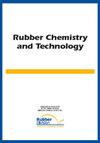橡胶硫化中的硫化图:三元乙丙橡胶的过氧化硫化
IF 1.5
4区 工程技术
Q4 POLYMER SCIENCE
引用次数: 0
摘要
“固化映射”采用固化流变仪的互补粘性和弹性输出,并将它们相互绘制,这样得到的图就不再在时域中。这种输出通常可用于橡胶硫化,在本文中,我们探索了三元乙丙橡胶上一系列过氧化物固化的固化图。来自移动模具流变仪输出的固化图是粘性扭矩与弹性扭矩的关系图,本文探讨的变量包括过氧化物和助剂的水平。该图遵循粘性到弹性特性的转换,其斜率可以被认为反映了促进或阻碍这种转换的反应的平衡。通过这种方法,探讨了上述固化变量对固化竞争反应的影响。可以揭示主要反应,为工业橡胶硫化过程中发生的变化提供新的视角。但硫化曲线图的价值超出了机理见解:这项研究表明,硫化曲线图对批次效应特别敏感。出现了一幅连贯的画面,揭示了如何有效利用常规固化数据来表征工艺历史和固化。本文章由计算机程序翻译,如有差异,请以英文原文为准。
CURE MAPPING IN RUBBER VULCANIZATION: PEROXIDE CURES OF EPDM
“Cure mapping” takes the complementary viscous and elastic outputs of cure rheometry and plots them against each other, so that the resultant plot is no longer in the time domain. Such outputs are routinely available for rubber vulcanization, and in this paper we explore the cure maps for a series of peroxide cures on EPDM. The cure map from moving die rheometer outputs is a plot of viscous torque against elastic torque, and the variables explored herein include the levels of peroxide and coagent. The plot follows the conversion of viscous to elastic character, and its slope can be considered to reflect the balance of reactions that promote or impede this conversion. By this approach, the effect of the above-mentioned cure variables on the competitive reactions of cure is explored. The dominant reactions can be revealed, to provide a fresh perspective on the changes occurring during an industrial rubber vulcanization. But the value of cure mapping extends beyond mechanistic insights: this study has shown the vulcanization cure maps to be particularly sensitive to batch effects. A coherent picture emerges to reveal how routine cure data can be productively exploited to characterize process history and cure.
求助全文
通过发布文献求助,成功后即可免费获取论文全文。
去求助
来源期刊

Rubber Chemistry and Technology
工程技术-高分子科学
CiteScore
3.50
自引率
20.00%
发文量
21
审稿时长
3.6 months
期刊介绍:
The scope of RC&T covers:
-Chemistry and Properties-
Mechanics-
Materials Science-
Nanocomposites-
Biotechnology-
Rubber Recycling-
Green Technology-
Characterization and Simulation.
Published continuously since 1928, the journal provides the deepest archive of published research in the field. Rubber Chemistry & Technology is read by scientists and engineers in academia, industry and government.
 求助内容:
求助内容: 应助结果提醒方式:
应助结果提醒方式:


